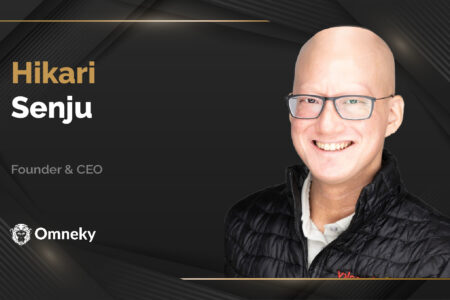“A good AI generated ad should not look like it was generated by AI, but should enable brands to better market their various product lines, better personalize for various markets.”
How did you leverage your educational background and entrepreneurial experience to pioneer Omneky as the frontrunner in generative AI for advertising, revolutionizing content personalization and driving significant returns for brands?
I grew up in New York, the son of an artist and grandson of a tech executive. My grandfather was an executive at IBM, so I grew up near the IBM headquarters in Westchester, and it was my grandfather who got me interested in technology at a very early age, and into technology startups as a way of marketing innovative new products. I also developed a keen intuition for Moore’s law, and the exponential rate in which technology improves. I had gotten into Harvard, MIT and Princeton for college, and though I ultimately decided to study Computer Science at Harvard (because I wanted to start a company and great entrepreneurs like Bill Gates and Mark Zuckerberg went there), I took alot of AI courses at MIT. It was at MIT where I saw the early generative models (text-to-image) that got me passionate about generative AI. The son of an artist, I had also grown up painting and creating architectural drawings, and the idea that AI could be creative was mind-blowing. I started playing around with open-sourced models on platforms like Hugging Face (who Omneky shares an early angel investor, Richard Socher),
Being entrepreneurial I also started two venture backed companies in college, one of which was a social app and the other one was a personalized learning application, where I also developed an intuition for the power of personalization. This personalized learning app, called Quickhelp, received grants from Harvard and MIT and some venture investments, and ultimately was acquired by Yup.com in San Francisco, where I became the Head of Growth. It was there, running programmatic omnichannel advertisements and creating advertising designs, that I saw an opportunity to apply this passion I had in generative AI to solve a market problem: how to create effective personalized content at scale.I started Omneky in 2018, with angel funding from my boss Naguib Sawiris, and a newly created fund called Village Global.
Hikari, can you tell us about your professional background and your current role at Omneky. Also tell us how does Omneky differentiate itself from other companies in the same space?
The vision I saw when founding Omneky was based on 3 theses, which differentiates Omneky today from the other generative ad products. 1) Generative AI would continue to be driven by open-source and therefore content was going to become a commodity and that value would accrue to the personalization engine that guides the generations based on data 2) the holding companies that traditionally dominated the advertising creative landscape were ripe for disruption due to trends in cable cutting and generative AI (Omneky’s name is partly inspired by Omnicom and our focus on omnichannel ads, and our logo is the same gold color at the Publicis lion logo) and 3) that due to the trends in buying ads directly from publishers and generating content yourself, marketing was moving in house and there was a need for a tool for in-house marketing teams to orchestrate omnichannel creative campaigns. And 4) was that due to the shift toward privacy, and the elimination of personalized targetting, the creative was going to become more important than ever for driving the success of advertising campaigns. Omneky’s focus and differentiation therefore is based on the generation of data-driven, personalized creative, and orchestrating omnichannel creative campaigns.
How can Omneky’s AI-powered creative platform help advertisers experiment with new concepts, iterate on top-performing ad creative, and reach fresh audiences while ensuring brand safety and efficiency in the production process?
Google’s Sr. Director of Global Strategic Analytics has said that “55% – 70% of a Marketing campaign’s success is influenced by the creative.” Especially as targetting options become more limited due to privacy changes, the ad creative is more important than ever. Omneky’s platform utilizes multi-modal AI and historical performance advertising data to discover trends in what kinds of designs and messaging is performing for specific target audiences. If you think about it, every role within a company has an analytics dashboard (product, marketing, sales, etc) but design. With advancements in computer vision and AI’s ability to understand images (and video), the elements in the creative itself can now be quantified and optimized. Omneky also trains our model on customer’s brand information and assets to ensure that even as we’re generating creative, that the creative is aligned with the customers own brand style. Customers can then use our product to generate ad creative personalized for any platform, audience, SKU and language, and can edit the creative directly within the platform. Customers can also provide feedback on the ad creative, and only ads that are “approved” are launched to the various ad platforms.
Also Read: MarTech360 Interview With Stas Tushinskiy, CEO And Co-founder At Instreamatic
How is Omneky’s approach to personalized marketing leveraging artificial intelligence to address the growing demand for individualized consumer experiences, and what advantages does it offer over traditional marketing methods?
It is now apparent to most people that the promise of generative AI is personalized experiences, personalized movies, personalized games, personalized browser experiences, personalized websites and apps. And generating these experiences is getting cheaper and faster by the week. However the market lacks an engine to power the personalization of digital experiences. Omneky’s vision is to be the personalization engine that powers all digital experiences – our vision statement from day one was to generate personalized experiences at scale. Our advantage compared to other marketing methods is this hyper focus on personalization, plugging into every data source possible, starting with all the ad networks, and building state of the art AI to discover as many creative insights about the design and messaging preferences of consumers.
How is AI image generation reshaping the landscape of advertising, and what are some key ways it’s revolutionizing the way brands connect with their audiences visually?
We’re in the very first innings of generative AI in advertising. We’re utilizing AI generative images to level up the ad creative to be more personalized and eye-catching, and to more cheaply and quickly create marketing collateral. We’re also utilizing AI avatars to replace human influencers in creating videos to sell and market products. There are still some challenges with diffusion based image generation today to generate pixel perfect product shots, so we’ve built our own models to break down a creative into components and layers, and to reassemble the creative to output an ad creative that looks great and is useful for brands. A good AI generated ad should not look like it was generated by AI, but should enable brands to better market their various product lines, better personalize for various markets, react faster to trends online, and launch and touch customers on more digital platforms, while keeping the brand essence consistent.
How does Omneky stay updated with evolving consumer preferences and trends to continuously refine its content personalization algorithms?
Omneky is plugged into all the ad platforms (social, CTV, retail media), as well as other data sources (CRMS, CDPs) and scrape the web, to garner as much information about consumer preferences. We additionally build our own AI to extract as many signals from the data as possible, quantifying design into features like persuasion tactics, message and cognitive load and visual hierarchy of the creative. Our insights are then automatically fed back into the Omneky Creative Generation process to deliver new creative that can garner additional creative insights and deliver high performing campaigns.
Being based in the SF Bay area also helps in us staying at the very forefront of Generative AI, learning about what’s in the works, and seeing around corners so we can deliver state of the art generative AI capabilities to customers before anyone else.
What advice do you have for other leaders who are looking to drive growth for their brand?
Speak with us. Our platform has been shown to deliver 8x efficiencies in the creative process, delivering more creative, faster, and resulting in on average 2x increase in Return On Ad Spend.
What is the biggest problem you or your team is solving this year?
Grow fast or die slow as they say, and our focus is on shipping as many great features for our customers as fast as possible and helping them harness the power of Generative AI to power their growth. Throughout the life of the company, our focus has been on Data-Driven Creative, and we’re going to remain focused on solving this problem for customers this year as we have every year.
Is there anything that you’re currently reading, or any favorite books, that you’d Recommend?
My hobby is reading, I listen to books while driving, while working out, before going to bed, on weekends. My general advice is to have an orientation to reading and learning as much and as broadly as possible. Some books that I’d recommend to understand AI and Advertising include The Everything Blueprint, The Worlds I See, Rise of the Data Cloud, Alchemy, The Master Algorithm, Propaganda, Second Machine Age, Narrative Economics, Human Compatible, The Signal and the Noise, Attention Merchants, The Content Trap, Blood in the Machine, The Coming Wave, Chip War, Frenemies, Prediction Machines, Superforcasting, Presuasion, Life 3.0.
Thanks, Hikari!
Hikari Senju is the Founder & CEO of Omneky, a generative AI company based in San Francisco that personalizes and orchestrates omnichannel creative content. Hikari studied Computer Science with a focus on Machine Learning at Harvard, where he also founded a personalized learning startup called Quickhelp which he later sold to Yup.com and became the company’s Head of Growth. It was at Yup running omnichannel marketing campaigns, along with his background in machine learning and passion for generative art (his dad is an artist) that Hikari came up with the idea for Omneky. Omneky’s AI analyzes what designs and stories are resonating with prospective customers and use these insights to generate brand-safe content most likely to drive sales. The company has been featured in NFX’s AI Hot 75 and other market maps, was the first generative AI company to pitch as a finalist at TechCrunch Disrupt, and most recently was highlighted in Jensen Huang’s GTC keynote.

